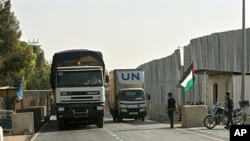Israel said Thursday it was easing its blockade of the Gaza Strip to allow more humanitarian aid into the Hamas-ruled territory. Government spokesman Mark Regev said Israel would allow more goods to reach Gaza and expand the flow of supplies for use in civilian projects under international supervision. He said materials that could be used to make weapons will still be banned. The decision follows intense international criticism that came after a deadly Israeli raid last month on an aid flotilla that was trying to break the blockade.
Israel's decision to allow more items to enter the Gaza Strip came Thursday after the security Cabinet met for two days.
A statement from Prime Minister Benjamin Netanyahu's office said Israel plans to allow in some construction materials - with international supervision. The statement gave no details on which other items would be allowed in.
Israel says the sea blockade will continue, as part of what it said are existing security procedures to prevent the inflow of weapons and war material to militants in Gaza.
The security Cabinet's decision follows a wave of international criticism after Israeli commandos stormed a flotilla of aid ships that challenged the blockade. Nine activists were killed in the raid.
|
Joe Stork of Human Rights Watch discusses Israeli decision:
|
The incident sparked a debate in Israel about the effectiveness of the three-year-old blockade, which aimed to stop the flow of weapons to Gaza and apply pressure on Gazans to topple Hamas, the Islamist militant group that controls the territory and whose charter calls for the elimination of the Jewish State.
Some analysts say Israel cannot - for its own security - afford to lift the blockade. Others wonder whether the blockade has actually strengthened Hamas.
Reuven Merhav is a former director general of the Israeli foreign ministry and is currently with the Center for Peace and Security, an organization of former high-level military, intelligence, and government officials.
"I don't think it has failed, but it needs to be rechecked and revised. Hamas is still ruling there," he said. "When you bring pressure to bear on a population, it will unite around its leadership."
Thursday's decision drew immediate criticism from the Palestinian leadership in the West Bank. Chief Palestinian negotiator Saeb Erekat said the new Israeli measures are - in his words - "not sufficient."
Erekat said the question is not about easing the closure. He said Israel must remove the blockade totally and open all borders between Gaza and Israel, allowing 100 percent of products to enter Gaza.
In the absence of details on the easing of restrictions, it was not clear how significant Thursday's announcement is.
Israel has routinely allowed scores of trucks to enter Gaza each day carrying basic supplies and fuel. Other supplies and luxury items are smuggled in through tunnels from Egypt.
Following the flotilla raid, Egypt eased its blockade by opening a crossing at its border with Gaza to limited passenger traffic.




